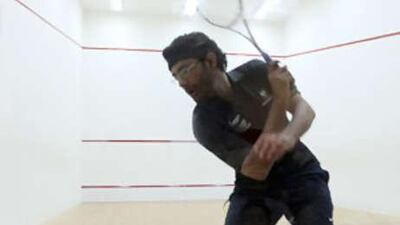Jahangir Khan and Jansher Khan, the Pakistani pair, enjoyed arguably the greatest rivalry in the history of squash. Between 1981 and 1986, Jahangir monopolised the world game, compiling an unbeaten streak in competitive play that lasted five years. His remarkable 555-match run was halted by his namesake Jansher. Their families came from the same village in the Peshawar region of northern Pakistan.
Jansher went on to beat Jahangir in their next eight encounters and capture the 1987 World Open title. It was therefore something of a coup that the organisers of the Abu Dhabi Open managed to lure both players for exhibition matches and guest appearances at their annual event in the 1980s. "Those were the good days," says Mabrouk al Nahdy, the chairman of the Abu Dhabi Squash Rackets Association. "The league alone had more than 300 players."
If those heady days represented the high watermark of squash in the Emirates, then last year represented the nadir. Participation levels were dwindling - the league shrinking to about 150 players - and the annual tournament was cancelled after the Sheraton Corniche hotel, which hosted the event for three years, pulled out. Management at the hotel were unhappy with the protocol surrounding a press statement released by the squash association. "It is a serious matter when a press release gets published in the newspapers without the prior approval of the management," says Mouna Ouni, the hotel's public relations director. It was the first time in more than 25 years the event had been postponed.
While the efforts of the squash association, and the presence of the Khans, failed to spark the next generation of players, the performances and talent of Adil Maqbool, 22, Aamir Khan, 18, and Mubarak Mohsin, 16, in this year's tournament suggest there could soon be a revival. Maqbool is leading the charge. Born in Abu Dhabi to Pakistani parents, he retained his Abu Dhabi Open crown on Saturday night. He was ranked 66 in the world before slipping to 100 as a result of the time he has spent studying for his exams.
Maqbool's father and coach, Khawaja, introduced him to the game and developed him to become the top player in the country. "I had the good fortune of being coached and nurtured by my father, and we both are ready to help conduct free coaching clinics," Maqbool says. "We also organised seven tournaments from 2007 to 2008, but there are lot of obstacles like seeking permission from various authorities that hindered our work.
"The biggest problem is that we don't have an active national federation to oversee the activities like staging regular competitions, implement coaching and take the game to the schools. "I have lived all my life in the UAE and I want to give back something to a country that I owe for what I am today, given the opportunity." Aamir is Maqbool's closest challenger, but the gap between the country's No 1 and No 2 was highlighted by the fact it was considered an achievement for Aamir to take a game off Maqbool during the final. Aamir is the defending champion of the Scottish Junior Open and ranked No 10 in the world at Under 19 level. He feels his chances to close the gap on Maqbool is being hampered by the lack of domestic competition.
"It is an individual sport and anyone who would be interested in making the grade can do so with some hard work," says Aamir. "But as young players, we need to have regular competition and stronger opponents to play with to improve." In fact Mohsin, the youngest of the trio, is forced to fly to Hong Kong, America and Britain to hasten his development. Like Maqbool, he has had to rely ostensibly on his father, Musa, for technical guidance.
An indication of the lack of depth in the game was that the father and son contested the third and fourth place play-off match in the Super division category. Mohsin claimed the bragging rights, winning in straight games. "We are all fortunate to have the coach-father blend, but we still have to work hard to fulfil our ambitions," says Mohsin. "A bit more support and encouragement by way of providing us more playing opportunities is all what we ask from those who promote the sport."
Al Nahdy acknowledged the flaws in the game but said they do not have the funds or the resources in an organisation run by expatriates. "The game is still very popular and the fact that the courts are fully booked throughout the year is ample evidence," he counters. "However, there haven't been many new faces at the competitive level, and that's a bit of a set-back in terms the quality of the tournaments."
Indeed this year's tournament required the sponsorship of a company of one of the players to go ahead. Mike Dravitzki, the fourth seed in the Division One section, sponsored this year's competition through his firm, Fugra. He says the decline in popularity of the sport in the country is symptomatic of a global trend. "Squash was big in the 1980s but it lost out to the other glamour sports and had this chain reaction," opines the New Zealander.
"Now would-be players are attracted towards the modern and sophisticated exercise machines rather than a good work out on the squash courts. And the kids are attracted to other glamour sports." Dravitzki agrees with Maqbool's view of the need for a national federation. "Of course, we would all like to welcome such a move and sport will definitely be better under the corporate governance of a national federation," he adds. "At the same time, we must admire all those former players and enthusiasts, mostly expatriates, that have kept the sport alive, even at hard times, for more than three decades."
@Email:apassela@thenational.ae


